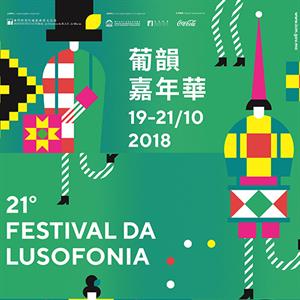Event Date: 19/10 (19:00 – 22:00), 20/10 (12:00 – 23:00), 21/10 (12:00 – 22:00)
Venue: Taipa-Houses
Organizer: Cultural Affairs Bureau
Co-organizer: Civic and Municipal Affairs Bureau, Macao Government Tourism Office
Organized by the Cultural Affairs Bureau and co-organized by the Macao Government Tourism Office and the Civic and Municipal Affairs Bureau, the Lusofonia Festival will be held from 19th to 21st October, at the Taipa-Houses. The Festival offers a diversified programme of activities, namely the culture of each community residing in Macau such as gastronomy, music and dance shows and games for all ages. All residents and tourists are welcome to participate in the event, and experience the joyful, cheerful and harmonious atmosphere and the multiculturalism of the Macao Special Administrative Region.
The first edition of the Lusofonia Festival was held in 1998, integrated in the programme of activities celebrating the Portuguese National Day on 10 June, honouring the Portuguese-speaking community residents in Macao for its contribution to Macao’s development. Over the years it has gained such popularity that became one of the greatest events in the cultural calendar of Macau, which has contributed to the promotion of both local and international tourism as well as urban animation and the creation of recreational and leisures spots for all.
Such event which takes place annually in October, is already considered a folk’s festival that attracts the participation of many residents from Macau, from Portuguese speaking countries, visitors from China, Hong Kong and from other countries who visit Macau during that period of time.
The programme of this edition of the Festival is as diversified as in previous years. Different booths of Macao Portuguese-speaking communities from ten countries or regions, namely Angola, Brazil, Cape Verde, Guinea-Bissau, Goa, Daman and Diu, Mozambique, Portugal, São Tomé and Príncipe, Macao and East Timor, will be set up, introducing their countries or regions’ traditional music, photographs, arts and crafts, costumes, literature and gastronomy, thereby injecting vitality in the Lusofonia Festival and allowing visitors to get to know in-depth the Portuguese-speaking countries and regions’ rich cultures.
In each day of the Festival, three groups from nine Portuguese-speaking countries and regions will perform different styles of music and dance on a stage built at the Taipa Houses Amphitheatre. Several local art groups will also perform on this stage, on another stage, namely at the Carmo Square, there will be soft music performances by local groups, daily from 7h30pm, allowing the public to enjoy music in a relaxed atmosphere while experiencing Portuguese-inspired gastronomy and delicacies.
In addition, a temporary restaurant serving Portuguese flavour and dishes, namely typical Portuguese grilled food and specialties from the various Portuguese-speaking countries/ regions will be installed.
In terms of recreation, visitors of all ages can participate in traditional Portuguese games and table football tournaments, as well as experience the sensations of the Guia Circuit through a Macau Grand Prix Simulator; while children can take photographs and take pony rides, as well as participate in various children’s games. A radio station will be installed on site to broadcast Portuguese music throughout the day.
The 21st Lusofonia Festival will take place on October 19th (Friday) between 7pm and 10pm, on October 20th between 12pm and 11pm (Saturday) and on October 21st (Sunday) between 12pm and and 10pm and the Taipa Housesallowing lots of animation and joy. All residents and tourists are welcome to participate and experience the festive atmosphere.

21st Lusofonia Festival

